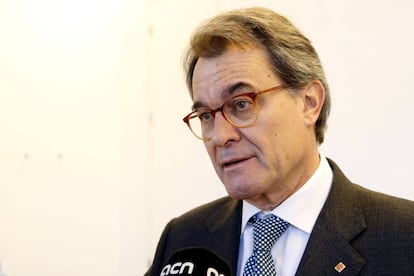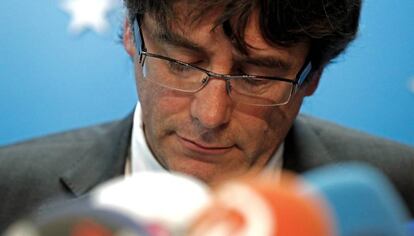Corruption conviction complicates secessionist plans in Catalonia
Court finds CDC, the predecessor of Puigdemont’s PDeCAT, guilty of taking kickbacks for contracts

On Monday, a court found the now-defunct Catalan party Convergència Democràtica de Catalunya (CDC) guilty of taking illegal commissions in exchange for awarding public works contracts while it was in power, and sentenced it to pay €6.6 million.
This is the first time that the justice system has confirmed there was illegal financing by CDC, which was Catalonia’s dominant party for decades. But the shadow of corruption had followed CDC for years: in 2005, former Catalan premier Pasqual Maragall popularized the term “three percent,” alluding to the amount of the kickbacks that CDC was believed to be taking in exchange for the contracts.
Convergència ran in 12 elections by cheating
Barcelona Mayor Ada Colau
The Audiencia de Barcelona found that these bribes took place over at least one decade, from 1999 to 2009.
In July 2016, the party was refounded as the Catalan Democratic Party, then renamed itself again, becoming the Catalan European Democratic Party (PDeCAT). This is the party of ousted premier Carles Puigdemont, who is currently living in self-imposed exile in Brussels, and of his predecessor Artur Mas, under whose tenure the independence process took off.
The conviction, which follows an eight-and-a-half-year investigation into wrongdoing at Palau de la Música, a landmark concert hall in Barcelona, places a new hurdle in the way of Puigdemont’s plans to get himself sworn in remotely as the new Catalan premier.

If the Supreme Court confirms the Barcelona provincial court’s decision, the party will struggle financially to pay the €6.6 million, which represents the kickbacks paid by construction firm Ferrovial to secure the contracts. The money was disguised as donations to the Palau, then channeled to CDC. Two former Palau managers have been sentenced to prison over the case.
Looking the other way
The PDeCAT’s reaction to the ruling illustrates its attempts to distance itself from the high-profile corruption case – just one of several scandals to affect CDC in its later years. In fact, the PDeCAT is saying that the conviction has nothing to do with the party, but “with Convergència Democràtica de Catalunya, a political group that has already taken on all political responsibility,” it said in a release.
The matter is “prior to 2010,” adds the statement in an attempt to protect former premier Artur Mas, who had been president of CDC and became the first president of PDeCAT following the refoundation. Catalonia held regional elections in 2010, which Artur Mas won with CDC at a time when it was still part of the Convergence and Union (CiU) federation.
Mas, who has been facing his own legal battles over the informal independence referendum of November 9, 2014, gave up the PDeCAT presidency on January 9 of this year, but expressly denied that this was a pre-emptive move ahead of an adverse court decision in the Palau case.
Following the Audiencia de Barcelona’s ruling, Mas said in a release that he was not expecting such a “harsh” decision, and that CDC has already paid “a very high price” by dissolving in 2016.
PDeCAT leaders should consider what kind of legacy they want to inherit from CDC
CDC does, in fact, still exist as a legal entity. When the ruling becomes final, a new debate will emerge over whether PDeCAT must be held accountable for part of the €6.6 million payment.
In any case, the news comes at a particularly bad time for relations between PDeCAT and the Catalan Republican Left (ERC). In the wake of the snap election of December 21, which yielded a parliamentary majority for separatist parties, PDeCAT and ERC are trying to hammer out a deal to get a separatist premier sworn in.
The spokesman for ERC, Sergi Sabrà said after the ruling that “whoever has to accept responsibilities should do so,” and warned that his own party will not “look the other way.” Sabrià also noted that his own party has not been involved in a single corruption case in its entire 87-year history. He underscored the need to “banish from politics all behavior tied to corruption.”
Cross-party criticism
There was also criticism from CUP, the small, far-left group whose support during the last political term was crucial to push the secessionist agenda forward. Eulàlia Reguant, a CUP councilor at Barcelona City Council and former regional deputy, said that PDeCAT leaders should consider what kind of legacy they want to inherit from CDC: “Is it the legacy of 4%?,” she asked, alluding to the fee that was paid in kickbacks for contracts.
When Artur Mas narrowly won a re-election in September 2015, he failed to secure enough support to get himself reinstated, and CUP, whose 10 seats gave it the role of kingmaker, demanded a different premier on the grounds that Mas’ name was too closely associated with corruption. The new leader who filled his shoes was Carles Puigdemont, who had been mayor of Girona until then.
Barcelona Mayor Ada Colau said that the ruling confirms “Convergència ran in 12 elections by cheating, with extra money it secured through the network,” alluding to the Palau scheme.
Ciudadanos official Carina Mejías said the ruling proves that “Convergència was a criminal organization” whose goal was to “fleece Catalans to benefit certain individuals.” Ciudadanos won the most votes and the most seats at the December 21 election, but not enough for a majority.
The Catalan Socialists (PSC) said Mas and Puigdemont must “provide explanations and stop hiding their heads in the sand,” while the Spanish justice minister, Rafael Catalá, said the court’s decision confirms that “in Spain, everyone has to obey the law.”
English version by Susana Urra.
Tu suscripción se está usando en otro dispositivo
¿Quieres añadir otro usuario a tu suscripción?
Si continúas leyendo en este dispositivo, no se podrá leer en el otro.
FlechaTu suscripción se está usando en otro dispositivo y solo puedes acceder a EL PAÍS desde un dispositivo a la vez.
Si quieres compartir tu cuenta, cambia tu suscripción a la modalidad Premium, así podrás añadir otro usuario. Cada uno accederá con su propia cuenta de email, lo que os permitirá personalizar vuestra experiencia en EL PAÍS.
¿Tienes una suscripción de empresa? Accede aquí para contratar más cuentas.
En el caso de no saber quién está usando tu cuenta, te recomendamos cambiar tu contraseña aquí.
Si decides continuar compartiendo tu cuenta, este mensaje se mostrará en tu dispositivo y en el de la otra persona que está usando tu cuenta de forma indefinida, afectando a tu experiencia de lectura. Puedes consultar aquí los términos y condiciones de la suscripción digital.








































